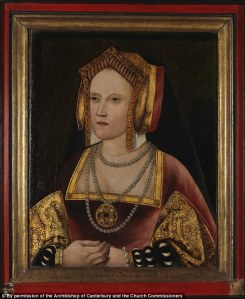
I was going to say that it takes a great writer to bring me near tears at the death of Katherine of Aragon. The truth is, Hilary Mantel (author of Bring Up the Bodies, which includes Katherine’s death) is a great writer, but the reality of Katherine of Aragon’s life is as tear-inducing as anything in Thomas Hardy: born Spanish royalty, betrothed to English royalty, married to a king, suffered the death of her infant son, had her daughter taken away from her, was herself thrown away, died soon after. Although Mantel’s portrayal is fiction and although it is hard for some to believe that a woman who died surrounded by servants and wealth was a woman abused, that is part of who she was.
The following is a conversation from Bring Up the Bodies between Thomas Cromwell and the ambassador of Emperor Charles V to England, Eustache Chapuys, in which Chapuys is voicing his regret at having not been present at Katherine’s death. Her words are those of a dying woman abused by her husband for long enough that she came to believe she deserved it.:
He rubs his blue hands. ‘I told her chaplain, you know. When she is on her deathbed, I said, ask her whether Prince Arthur left her a virgin or not. All the world must believe a declaration made by a dying woman. But he is an old man. In his grief and trouble he forgot. So now we will never be sure.’
That is a large admission, [Cromwell] thinks: that the truth may be other than what Katherine had told us all these years. ‘But you do know,’ Chapuys says, ‘before I left her, she said a troubling thing to me. She said, “It might be all my fault. That I stood out against the king, when I could have made an honorable withdrawal and let him marry again.” I said to her, madam–because I was amazed–madam, what are you thinking, you have right on your side, the great weight of opinion, lay and clerical –
“Ah, but,” she said to me, “to the lawyers there was doubt in the case. And if I erred, then I drove the king, who does not brook opposition, to act according to his worse nature, and therefore I partly share in the guilt of his sin.” I said to her, good madam, only the harshest authority would say so; let the king bear his own sins, let him answer for them. But she shook her head.’ Chapuys shakes his, distressed, perplexed. ‘All those deaths, the good Bishop Fisher, Thomas More, the sainted monks of the Charterhouse…”I am going out of life,” she said, “dragging their corpses.”
